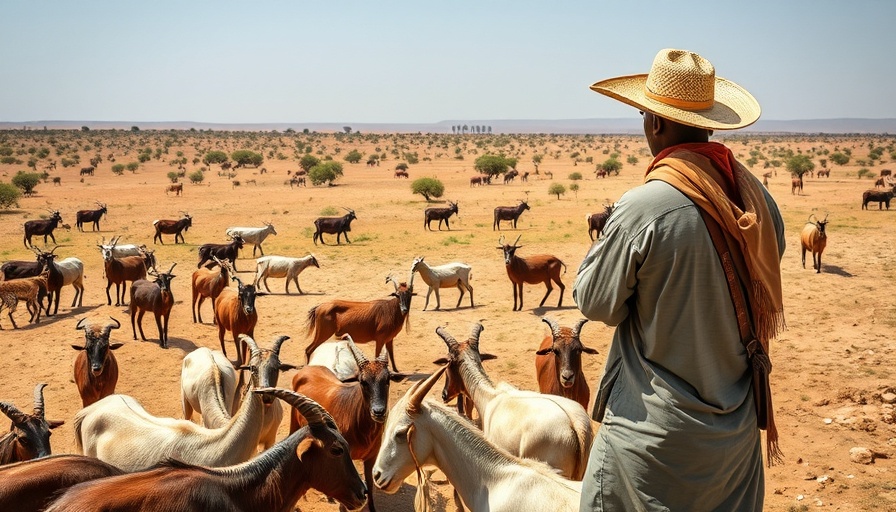
Understanding the Rise of Farmer-Herder Tensions in Africa
In recent years, the landscape of Africa has become increasingly treacherous for both pastoralists and farmers, with tensions steadily escalating into violent confrontations. Driven largely by environmental changes, demographic shifts, and competing economic interests, this conflict has the potential to disrupt not just local livelihoods but also regional stability. As urban populations grow and agricultural demands shift, the competition for land and water resources has intensified, particularly in arid regions like the Sahel and the Horn of Africa.
The Land: A Central Element in the Conflict
Considering the heart of the issue requires a closer look at the role of land, which carries both economic and cultural significance in African societies. Over 60% of the continent's population relies on land for survival. As rainfall patterns shift and droughts become more common, pastoral communities find their migratory routes blocked by expanding agricultural land, aggravating existing grievances. Tensions often turn violent when one group feels marginalized by policies favoring the other, particularly when ethnic identities intersect with land usage rights.
Factors Exacerbating Tensions
As noted in previous reports, key drivers of conflict include pressure on land due to population growth and agricultural expansion. The rural population across West Africa has surged over 40% over the last two decades, further complicating traditional agreements that once successfully mediated disputes between farmers and herders. Moreover, criminal activities such as livestock theft have risen sharply, increasing the stakes and severity of confrontations. Herders armed to protect their animals are often viewed with suspicion by farmers, intensifying the cycle of violence.
Case Study: Nigeria's Rising Violence
Nigeria is a hotbed for violent farmer-herder conflicts, where policies like the anti-open grazing laws have sparked significant backlash from pastoralists. Rather than alleviating tensions, these laws have often escalated them, driving herders into more conflict-prone areas. Despite the occasional successes seen in states adopting dialogue-based dispute resolution practices—like the effective Kabara committees—the persistence of anti-pastoral sentiment complicates long-term peaceful coexistence between these groups.
The Role of External Influences
Government interventions, often driven by economic interests, have regularly disregarded the traditional land rights of pastoralists. This modern encroachment creates layers of conflict as outside actors disrupt historic grazing routes or designate lands without considering the voices of local communities. The increasing involvement of foreign corporations in large-scale agricultural land acquisitions has displaced many pastoralists, forcing them into precarious living conditions and exacerbating hostilities.
Future Outputs Requiring Focus on Tech Integration
As the conflict scenario continues to evolve, integrating technology into traditional practices may provide innovative solutions. Tools like AI and machine learning could assist in monitoring land use, ensuring transparency in resource allocation, and providing real-time data on drought conditions. Such technological solutions could foster efficient and sustainable agricultural practices, potentially reducing tensions over scarce resources.
Opportunities for Constructive Change
Ultimately, collective efforts involving local authorities, civil society, and external funding agencies can address the root causes of tension. Training local leaders in conflict resolution, alongside implementing fair and inclusive land management policies, will be crucial in fostering coexistence between farmers and herders. The need for sustainable resource-sharing agreements is paramount in mitigating future conflicts and forging a path toward peace.
Conclusion: A Call to Reassess Strategies
The burgeoning farmer-herder conflicts across Africa serve as a stark reminder of the evolving dynamics within agricultural and pastoralist communities due to shifting environmental conditions and socio-political factors. By recognizing the intricate relationship between these groups and investing in inclusive strategies for conflict resolution and equitable resource access, stakeholders can work toward a more stable and prosperous coexistence. As we look to the future, leveraging technology alongside traditional practices may offer pathways for significant societal transformation. It is imperative for political leaders, community elders, and international bodies alike to prioritize integrative approaches that bolster social cohesion over division.
 Add Row
Add Row  Add
Add 




Write A Comment